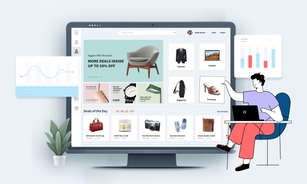- ProductsSearch and BrowseRecommendationsCustomer Engagement
Why Dynamic Facets matter in ecommerce: Enhancing relevance and speed for shoppers

Facets have become essential for modern ecommerce businesses, addressing key challenges in product discoverability, personalization, and user experience. By dynamically updating filters based on shopper interactions, retailers create a highly engaging and tailored shopping journey.
How traditional facets fall short in personalization and efficiency?
Imagine a shopper searching an online electronics store for a new laptop. With standard, fixed facets, the filter options stay the same regardless of their search choices. They initially see options like brand, screen size, and price, but even as they begin exploring high-performance models, these facets don’t adapt.
There are no additional options to filter by features like processor type, RAM size, or battery life, which could be important to a tech-savvy shopper. This static setup limits their ability to refine results based on detailed specs, possibly making the search process slower and less effective.
Slow, cumbersome navigation:
Static facets don’t adapt to individual searches or user behaviors, often leading to frustration as shoppers struggle to refine results.
Irrelevant filters and overcrowded options:
Without personalization, shoppers are left with generic filters, some of which may not be relevant to their query or category.
Poor discoverability:
Shoppers may miss out on suitable products because filters aren't prioritized based on relevance or behavior, leading to a decline in conversions and satisfaction.
Netcore Unbxd Dynamic Facets addresses these issues head-on.
What is dynamic faceting, and how does It work?
Coming back to the example of a shopper browsing laptops at an electronics store online, they start with standard filters like brand, screen size, and price. As they refine their search to focus on high-performance models, the filters dynamically adjust, now offering additional options like processor type, RAM size, and battery life—perfectly tailored to their interests.
This adaptive filtering provides them with exactly the options they need to zero in on the product they want. In technical terms, the facets will change based on,
Product Attributes:
Display relevant facets based on current product categories, such as clothing fabric or electronics screen size.
Shopper Behavior:
Adapt facets to reflect common selections and behaviors, making it easier for customers to find exactly what they need.
Why should you, as a retailer, care about personalization of Facets?
1. Higher engagement and customer loyalty
Dynamic facets provide a responsive search experience that adapts to each shopper’s preferences and behaviors. Shoppers can easily refine results, leading to faster product discovery and a more personalized journey.
2. Greater product discoverability
Dynamic faceting reveals valuable products by aligning facets with relevant search terms and behaviors, increasing the chances of shoppers finding precisely what they need.
3. Streamlined purchase paths and increased conversions
Dynamic faceting makes product search and filtering effortless, reducing friction in the shopping experience, driving higher engagement, and increasing conversion rates.
4. SEO optimization
Dynamic facets improve content relevance and structure, creating filterable options that enhance SEO by making your catalog more accessible and appealing to search engines.
Netcore Unbxd precision filtering that adapts to shoppers
Intelligent data processing and facet creation
Netcore Unbxd seamlessly integrates with your product catalog, processing data to generate filters that match each product category. This means shoppers see relevant options at every step of their search, easily guiding them to the right products.
Real-time facet updates
As users navigate and filter, facets are updated instantly, ensuring they always reflect the most relevant options. If product availability changes, so do the filters—keeping users focused on what’s currently available.
Customized facets for each product category
With Netcore Unbxd, facets are tailored to specific categories, offering filters that fit each product type. So, shoppers browsing apparel see filters for material type, while those looking at electronics can filter by wattage or other technical specifications.
Exploring Netcore Unbxd’s key facet types
1. Hierarchical Facets
Allow shoppers to refine their choices from broad categories to specific subcategories, much like a browseable directory.
2. Text Facets
Display options like color, brand, or size as clickable text filters, ideal for discrete attributes that simplify shopper decision-making.
3. Range Facets
Let shoppers set value ranges, such as price or ratings, with intuitive sliders. These sliders help users refine options without being confined to preset values.
4. Merchandised Facets
Customize facets based on product categories, allowing ecommerce sites with diverse inventory to provide relevant filters that match each category.
Customizing dynamic Facets for a unique brand experience
With Netcore Unbxd, businesses have extensive control over how facets appear and function:
Facet Appearance
Choose layouts and styles that align with brand aesthetics.
Facet Behavior
Decide if facets should be visible by default or appear only after a user initiates a search.
Facet Content
Add custom labels and descriptions for each facet, enhancing user engagement.
Precision Filtering Options
Implement filters that match various shopper intents, from exact matches to broad keyword-based filters.
Continue optimizing for the best experience
Dynamic faceting provides real-time insights into how customers interact with filters, allowing businesses to optimize their filtering strategy. By analyzing facet usage and shopper behavior, businesses can refine filters, prioritize popular options, and adapt to changing preferences, ensuring a more relevant and efficient shopping experience.
Shoppers of any day and age want personalized discovery and ease of navigation. Netcore Unbxd’s Dynamic Faceting equips businesses with the tools to deliver a responsive, customized shopping experience. Whether through hierarchical facets for category exploration, range facets for flexible filtering, or merchandising facets tailored to product types, dynamic faceting enables a more intuitive and efficient shopping journey—resulting in satisfied, loyal customers and increased sales.
If you want to explore Netcore Unbxd's Dynamic Faceting, book a demo


